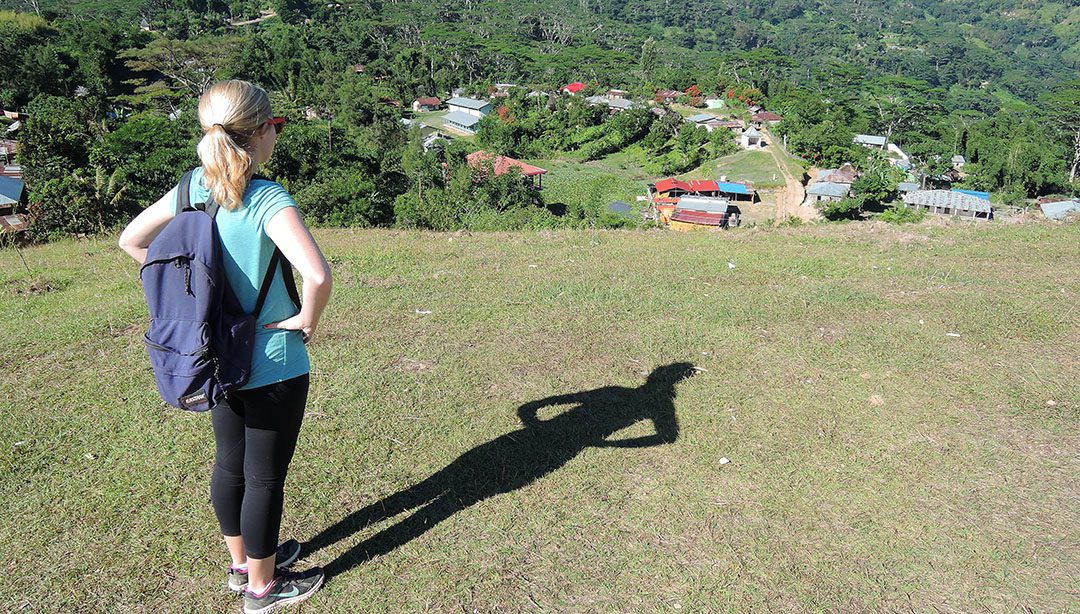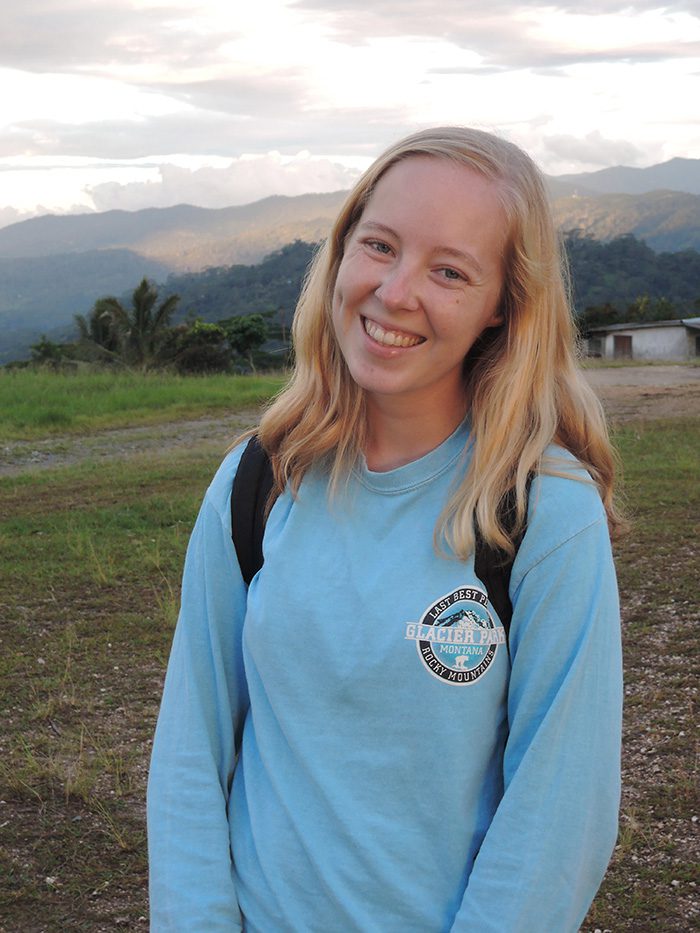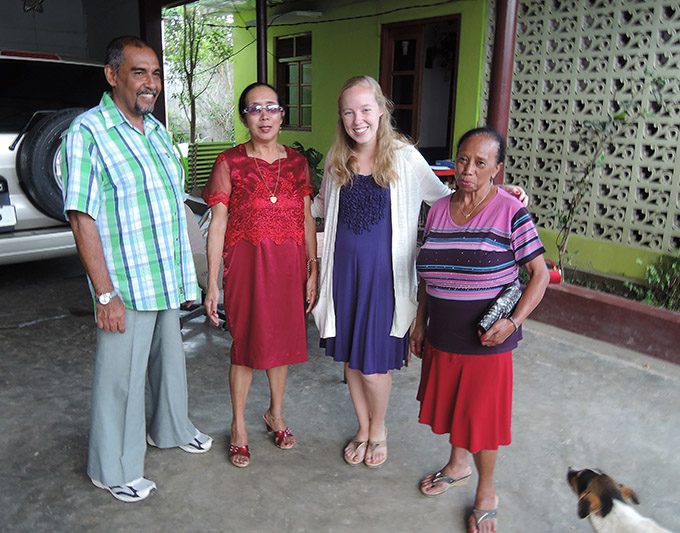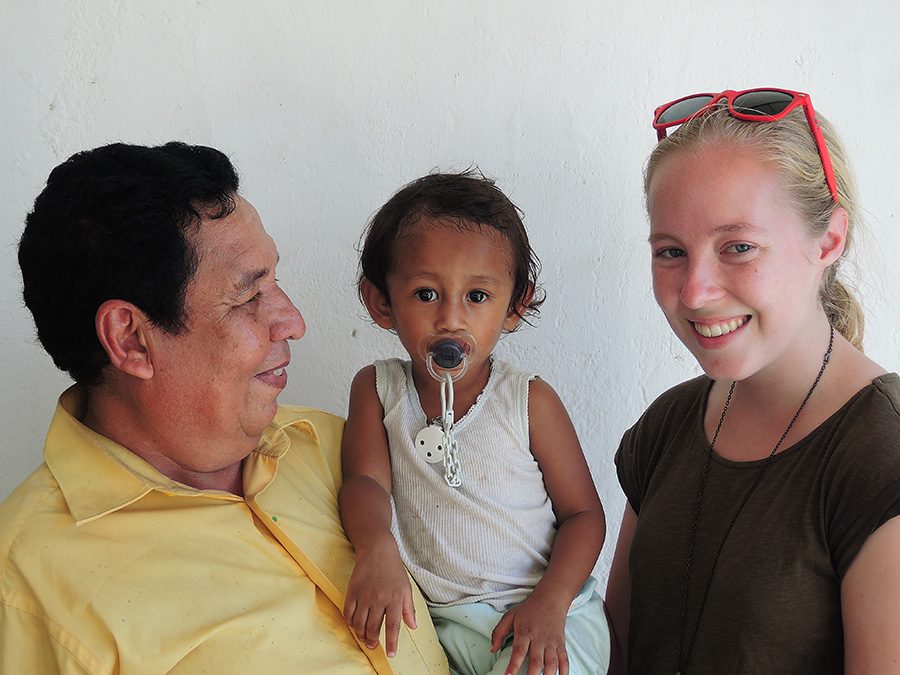Ready for the world

Furman University prepared Alice Williams ’15 for life in Asia. And now, life in Asia is preparing her for anything.
Williams is serving with the Peace Corps in Timor-Leste. The country was formed in 2002, in what had been the Indonesian province of East Timor. The Peace Corps worked in the new country for a few years but pulled out when violence erupted in 2006. Williams arrived in October 2015, as part of the first Peace Corps team back in Timor-Leste since its political and military situation stabilized.
Williams is no stranger to overseas travel and work. She took advantage of multiple opportunities available through Furman to explore and learn. The first was the summer experience in China before her freshman year, which prompted her to study Chinese–and major in Asian studies.

Alice Williams in the village of Ponilala on the hill just above her host family’s home.
“It was the first time I’d ever experienced bucket showers or squat toilets,” she said, laughing.
Her mother, Ann Laidlaw, said a 2013 semester in India was life-changing for Williams.
“What Furman gave her was access, even before she was a freshman,” Laidlaw said.
Some of her other experiences included a summer internship at the Centers for Disease Control in Atlanta, Ga., and a May X trip to Guatemala. Seeing the world played a huge role in shaping Williams’ perspective and her plans for the future.
“It really can pay off if you’re willing to take advantage of those opportunities,” said her father, Ron Williams ’82.
Williams said the experiences gave her courage and confidence.
“Seeing I was capable of doing that opened up the world to me,” she said. “It helped me realize it’s good to push outside of your comfort zone and do things you don’t think you can do.”
Savita Nair, James B. Duke Associate Professor of Asian Studies and History, remembers Williams coming to her long before details for the India trip were finalized—she wanted to know how soon she could officially join the group.
Nair sees in Williams a unique combination of intellectual adventurism, social openness and cultural sensibility. A “trinity,” Nair calls it.
“She has a really deep understanding of, ‘This is their home, this matters so much to them. I’m a guest,’” Nair said. “I can only imagine how this is all totally fulfilling itself in the Peace Corps context. She was so ready for this.”
At Furman, Williams crafted an Individualized Curriculum Program to focus on her two passions—Asia and global health. Shortly before finishing her bachelor’s degree, she decided she’d apply to the Peace Corps. But she wasn’t confident she’d be accepted.

Alice and her host family.
“I thought it sounded like such a crazy, out-there dream that I didn’t even say it out loud,” she said.
A month later, she’d been accepted into one of her top-three choices, community development and public health work in Timor-Leste. She was in the country the fall after her graduation.
After a three-month crash course in the language, as well as in agriculture, nutrition and sanitation, she was sent into her village, or “suku.”
The larger village has about 4,000 people. In Williams’ neighborhood, there are about 300.
Williams works in community development, an intentionally broad designation. Specifically, in her village, it means working to improve nutrition and sanitation and supporting small business development.
Peanut butter has been the answer in two of those areas. Williams is teaching people to make it and sell it, as well as to make jam from tropical fruits. Her current project is a papaya/pineapple blend.
About half the children under 5 are malnourished, she said. Protein typically is a huge gap in their diets.
Being the first group back into the country has meant the infrastructure for the Peace Corps is spotty at best. Williams was initially placed with a family with 10 children. She realized quickly that her presence was a burden on their limited resources. She worked on her own to find another host family better equipped to house her.
Her host mom, dad and grandma sell rice, oil and sugar that they bring in on a truck from the capital, a four- to five-hour trip away. They also buy coffee beans from local farmers and clean, roast and resell them.

Alice in the capital city of Dili with a relative of her host family and his child.
Living among the people has helped Williams understand that everyone, everywhere is interested in the same basic things.
“Parents here also want their kids to be healthy and get a good education, and worry about finding work and supporting themselves,” she said.
Williams is learning all sorts of skills, including chasing the bus that’s never on schedule and hiking up to the highest point in the village to get reception for a phone call home.
But the practical challenges aren’t the hardest part.
“The hardest thing a lot of times is the isolation,” Williams said. “There’s no one within hours of me that speaks English fluently, or understands American pop culture references.”
She admits there were hard days, times she wondered what she doing. But she wouldn’t change things now, even if she had the chance to do it again.
“I’ve gotten to a place where I’m happy to be here,” she said.
And when she leaves, the choices ahead of her don’t look so overwhelming.
“After this, there’s very little that could intimidate me,” Williams said.
“That’s an awesome thing to be able to say when you’re only in your 20s,” Laidlaw said.
Five students in Furman’s Class of 2017 have been accepted by the Peace Corps to serve across the globe: Kristina Benson (Paraguay), Emily Gale (Belize), Kjersti Kleine (Lesotho), Alexi Muhumure (Rwanda), and Miguel Negrete (Ecuador).